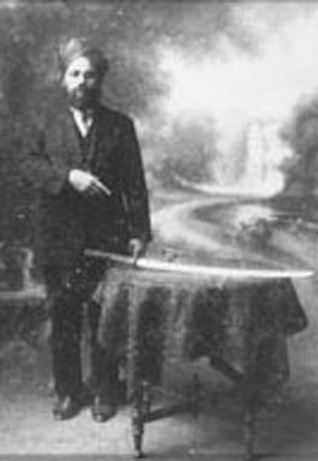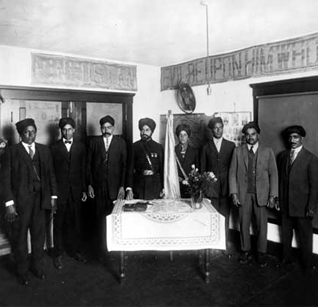
Above: Bhagwan Singh, Oregon, 1915. Below, first from bottom: sketch by Canadian artist, Jarnail Singh.


History
The Birth of a Revolution ... Remembered: Diaspora Diaries
SARBPREET SINGH
The City of Astoria in Clatsop County, Oregon USA. Founded in 1811.
Ten thousand people living at the mouth of the Columbia River. Just another nondescript American town, it seems, with the modest distinction of having been the oldest settlement west of the Rocky Mountains.
On October 4 & 5, 2013, a most unlikely group will converge upon Astoria for a rather unexpected celebration of a watershed event in the history of the Sikh Diaspora.
An academic from Washington, USA. A brilliant documentary filmmaker from Toronto, Canada. A writer from Surrey, Canada, a city that is home to a large Sikh population, with many musicians, litterateurs and political leaders among its ranks. And a historian with the sensibilities of a poet.
Astoria, Oregon will host an October commemoration to mark the 100-year anniversary of the founding of the Ghadar Party, which constituted the beginning of independence movement to free the South asian subcontinent of its British occupiers. The political movement, driven mainly by Sikhs -- often identified in that era by the then slur, ‘Hindus‘ -- of the North American West, “crystallized during a meeting in Astoria’s local Finnish Socialist Hall in May 1913.”
The most interesting aspect of this celebration is the fact that today in Astoria, there is virtually no trace of these Sikhs and their presence in this part of the world.
Almost as interesting as the story of the founding of the Ghadar Party, is the modern day tale of how the link between Astoria and the struggle for independence was discovered, by a dogged historian, whose generous embrace of the ‘Other’ is truly emblematic of what makes this country great.
9-11 was a seminal event that had a profound impact on every American. Some reacted with sorrow; others spewed anger and hate.
There were also many, like Johanna Ogden, who turned inwards as the aftermath of 9-11 unfolded, which included the backlash against Muslims and -- through mistaken identity -- Sikhs, to ponder the question of how, in the flash of an eye, we can start seeing our erstwhile friends and neighbors as the ‘Other‘, to the extent that we can justify targeting them with violence and death.
From her introspection was born the desire to do something in response. To demonstrate that not everyone in this country felt this way.
Several years later, in 2008, as she prepared to enter graduate school, still seeking a specific direction in her personal quest, she crossed paths with Dr. Kambiz GhaneaBassiri a professor in the Religion Department of Reed College, who was working on a book on the history Islam in America.
She credits him with introducing her to the Punjabi-American and Sikh-American community and its role in the Ghadar movement, which she had been unaware of until then.
Ogden began researching in Astoria and started finding mentions of deaths and funerals of men with Punjabi names. She kept finding other mention of Punjabis and Sikhs in the papers, in accounts of strikes and wrestling bouts! She learned that many had left Astoria to go fight the British in India. She found census and arrest records.
And eventually, she found mention of a speech by Ghadar intellectual Har Dyal and a meeting in Astoria’s Finnish Socialist Hall in 1913. Tantalizing clues like these led her to suspect that the Punjabi/Sikh community around Astoria had a deep connection to the founding of Ghadar.
Ogden struck historical gold after she discovered the work of Harish Puri, a well known Indian historian who has done considerable work on the subject and has written several books, documenting his conversations with Ghadarites, decades
ago. His work helped her understand the importance of what she was finding.
She had found nothing less than the story of Ghadar's emergence and a real sense of how some of the unique features of Astoria at that time contributed to the Ghadar Movement's crystallization!
Puri's book had a roadmap, which listed in a few lines, the towns where Ghadar meetings had occurred.
The hunt was on!
She went to towns all along the Columbia River eventually and tracked down census records as everything was now in focus. The story of the founding of Ghadar in Astoria, would finally be told.
In Ogden’s own words, from a conversation I had with her:
“I did not write to Harish until after I had finished my thesis. And I sent it to him and told him how much his work had meant to me. And how surreal it had been to be on the other side of the world, to be removed by 30 or 40 years, and to find a roadmap to my home and this silenced history. “
In addition to her thesis, Ogden’s findings were also presented in a brilliant paper titled “Ghadar, Historical Silences, and Notions of Belonging: Early 1900s Punjabis of the Columbia River”, published in the Oregon Historical Quarterly, Vol. 113, No. 2 (Summer 2012).
I would strongly encourage every Sikh to read Johanna Ogden’s paper, which can be found at the Oregon Historical Society’s website. [Please see below].
The paper, despite being an academic work, is readable and highly accessible. The author‘s compassion for the subjects of her research and the ethos of her work can be clearly felt in the following excerpt:
“The story of Ghadar in the Pacific Northwest is, without a doubt, intriguing. For me, its historical importance lies in the realities it reveals about the transnational making of the region and the historical downplaying, if not silencing, of that very process. The erasure of Asian Indians in Oregon is rooted in myths that have privileged settlement over transience and rigid nationalist fables over stories of global peoples -- whether Chinese, Japanese, or Hindustani — who were, and are, intrinsic to the region. Those myths have shaped our archives and stories, and they continue to haunt us through their impact on the notions of belonging and otherness in post-9/11 America. Re-remembering the Punjabis of Oregon -- communities of laborers and political activists stretching the length of the Columbia River -- prompts one to consider the process of their erasure.”
Johanna Ogden will be one of the panelists in The Clatsop County’s commemoration of the birth of the Ghadar movement in October. She will be joined by Paul Englesberg, educator and researcher on the history of Asian Americans in the Pacific Northwest. He has written about the 1907 Bellingham anti-Indian riot.
As well, Sohan Pooni, historian, author, and biographer of Ghadar activists, who has written a book in Punjabi titled “Canada De Ghadari Yodhe” (“The Revolutionary Warriors of Canada”).
Also on the panel will be the well-known Canadian filmmaker, Ali Kazimi, whose documentary, Continuous Journey, which tells the story of the Komagata Maru incident, an important event in Ghadar history, will be shown during the commemoration.
I strongly encourage our readers to travel to Astoria on October 4/5 to participate in this grand and unprecedented celebration of our history in this country. It will be a small way to acknowledge the monumental effort that has gone into this research and the commitment that Johanna Ogden and Ali Kazimi in particular have shown towards documenting the forgotten stories of those whose very presence has been all but erased from the history of this nation and continent.
Even if you can’t make it, please circulate this information widely within your personal networks. That will be your part in preserving the little piece that belongs to us in the great and beautiful mosaic that is America.
Finally I will again offer Johanna Ogden’s words on the import of her research and the celebration:
“I think the larger argument is about how unique forces and people came together in Astoria and how the larger West Coast Punjabi/Sikh community was able to make use of that. And perhaps some unique forces are coming together again - in post 9/11 America - to commemorate this amazing story.”
Be there! I will be, for sure!
To read Johanna Ogden`s paper, please CLICK here.
August 21, 2013
Conversation about this article
1: Sunny Grewal (Abbotsford, British Columbia, Canada), August 21, 2013, 7:36 PM.
What luck! I am in Oregon for my studies, I will definitely be attending!


